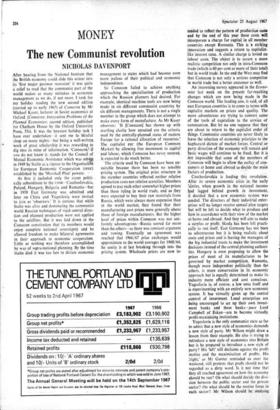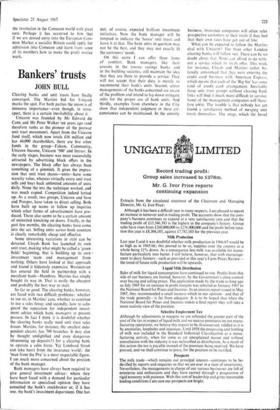The new Communist revolution MONEY
NICHOLAS DAVENPORT
After hearing from the National Institute that the British economy could slide this winter into its 'first major postwar recession' it was quite a relief to read that the communist part of the world makes as many mistakes in economic management as we do, if not more. I took for my holiday reading the new second edition (carried up to early 1967) of Comecon by Mr Michael Kaser, lecturer in Soviet economics at Oxford. (Comecon: integration Problems of the Planned Economies; second edition, published for Chatham House by the Oxford University Press, 35s). It was the heaviest holiday task I have ever undertaken—it sent me to blissful sleep on many nights but being a well-written e- work of great scholarship it was rewarding to dig into its mine of information. 'Comecon,' if you do not know it, stands for the Council of Mutual Economic Assistance which was seL4ip lb 1949 by Stalin as a riposte to the OrganisatiOn for European Economic Cooperation (mEc) established by the 'Marshall Plan' powers. -
At first it included only the states politi- cally subordinate to the ussu—Czechoslovakia, Poland, Hungary, Bulgaria and Rumania—but in 1950 East Germany was admitted and later on China and Yugoslavia were invited to join as 'observers.' It is curious that while Stalin was alive and dominating the communist world Russian techniques of rigid central direc- tion and planned production were not applied to the satellites. But it was laid down in the Comecon constitution that its members would enjoy complete national sovereignty and be allowed freedom to make bilateral agreements in their approach to economic cooperation. Little or nothing was •therefore accomplished by way of supra-national planning. By the time Stalin died it was too late to dictate economic management to states which had become even more jealous of their political and economic independence.
So Comecon failed to achieve anything approaching the specialisation of production which the Russian planners had desired. For example, identical machine tools are now being made in six different communist countries by six different managements. There is not a single member in the group which does not attempt to make every form of manufacture. As Mr Kaser observes: 'It [Comecon] has shown up with startling clarity how unsuited are the criteria used by the centrally-planned states of eastern Europe for a rational allocation of resources.' The capitalist EEC (the European Common Market) by allowing free movement to capital and labour, which Comecon has never secured, is expected to do much better.
The criteria used by Comecon have been un- suitable because there has been no sensible pricing system. The original price structure in the member countries reflected neither relative production costs nor relative scarcities. Members agreed to pay each other somewhat higher prices than those ruling in world trade, and as they were expected to buy their raw materials from Russia, which were always more expensive than in the world market, they found that their manufacturing cost prices were generally above those of foreign manufacturers. But the higher level of prices within Comecon was not uni- formly advantageous—Russia scored far more than the others—so there was constant argument and rowing. Eventually an agreement was reached that 1966/67 price exchanges would approximate to the world averages for 1960/64. So sanity is at last breaking through into the pricing system. Wholesale prices are now in- tended to reflect the pattern of production costs and by the end of this year these costs will incorporate a charge for capital in all member countries except Rumania. This is a striking innovation and suggests a return to capitalist- like interest rates. A similar charge is levied on labour costs. The object is to secure a more realistic competition not only in intra-Comecon trade (which is 60 per cent or more of their total) but in world trade. In the end the West may find that Comecon is not only a serious competitor in world trade but a better customer as well.
An interesting survey appeared in the Econo- mist last week on the present far-reaching changes which are now being made in the Comecon world. The leading aim, it said, of all east European countries is to come to terms with capitalist markets on prices and quality. The more adventurous are trying to convert some of the tools of capitalism to the service of communism. But let no one suppose that they are about to return to the capitalist order of things. Communist countries are never likely to leave the selection of economic priorities to the haphazard dictate of market forces. Central or party direction of the economy will remain and basic wages will continue to be fixed. But it is not impossible that some of the members, of Comecon will begin to allow the outlay of con- sumers at home and abroad to decide the main factors of production.
Czechoslovakia is leading this revolution. After its severe economic crisis in, the early 'sixties, when growth in the national income had lagged behind growth in investment, it decided that a new economic system was needed. The directors of their industrial enter- prises will no longer receive annual plan targets but will be left to decide what to produce and how in accordance with their view of the market at home and abroad. And they will aim to make a surplus or profit. Skoda has been left practi- cally to run itself. East Germany has not been so adventurous but it is being realistic about costs and prices and is leaving the managers of the big industrial trusts to make the investment decisions instead of the central planning authori- ties. Hungary is even proposing to allow the prices of most of its manufactures to be governed by market competition. Rumania, though more independent politically than the others, is more conservative in its economic approach but is equally determined to make its industry more efficient and cost conscious. Yugoslavia is, of course, a law unto itself and is experimenting with an entirely new economic system. It has virtually given up the central control of investment. Local enterprises are being encouraged to set up their own invest- ment banks and these banks—pace Lord Campbell of Eskan—are to become virtually profit-maximising institutions.
Yugoslavia is the only communist state so far to admit that a new style of economics demands a new style of party. Mr Wilson might draw a lesson from their example. He also is trying to introduce a new style of economics into Britain but is he prepared to introduce a new style of party? His 'left' still declaims against the profit motive and the maximisation of profits. His .`right,' as Mr Gunter reminded us over the weekend, still protests that profit should not be regarded as a dirty word. Is it not time that they all reached agreement on how the economy should be run? On what should decide the divi- sion between the public sector and the private sector? On what should be the motive force in eath sector? Mr Wilson should be studying
the revolution in the Comecon world with great Care. Perhaps it has occurred to him that if we are denied entry into the European Com- mon Market a socialist Britain could apply for admission into Comecon and learn from some of its members how to make the profit motive work.































 Previous page
Previous page